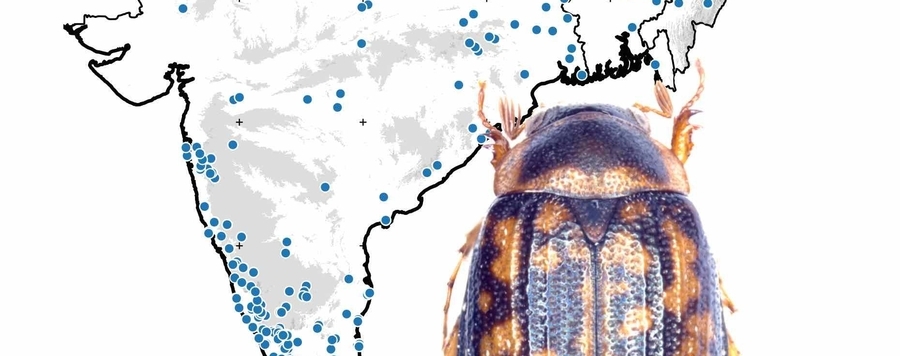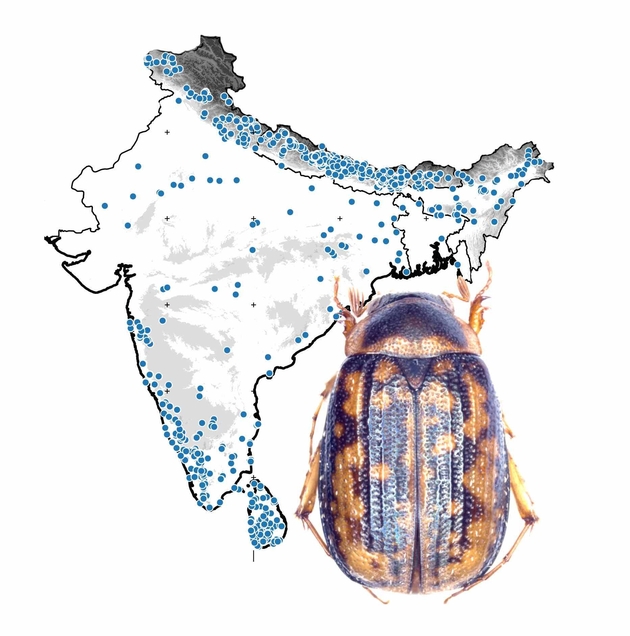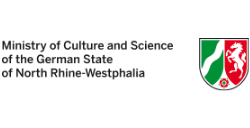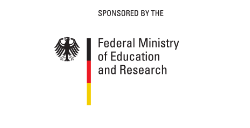From time to time one has notice from a single newly discovered species from the remote depth of oceans or of rain forests. However, how badly we know the life on Earth shows a work recently published in the "Bonn zoological Bulletin" by Dirk Ahrens und Silvia Fabrizi, scientists from the Zoological Research Museum Alexander Koenig – Leibniz-Institute for Biodiversity of animals (ZFMK) in Bonn. They discovered at one blow 127 new species of mini chafers (scarab beetles of the tribe Sericini) from the Indian subcontinent. While only 4 species of this group occur in Central Europe, in India now more than 600 species are known.
The researchers collected none of these new species themselves, all of them waited since decades in different natural history museums of the world to be discovered after they were accumulated step by step by different collectors over the years. In course of this long-term project it was for example also unveiled the identity of the mysterious Khomeini's beetle, a serious pest in Israel's agriculture in the 1990s, what was for long thought to be a biological weapon of Ayatollah Khomeini. Instead, Ahrens revealed in 2000 the origin of this since long known species being India and that it became an invasive species since the 1960s over the entire Middle East.
That the work of the two scientists took that long, was not because they were so slow, but because taxonomists, the researchers who deal with the naming and discovering new species, do obtain nearly no public funding for this type of work, at least not in Germany.
Compared to attempts in international biodiversity research as for example in China, India, or United States and also compared to already available resources, expenses in Germany are by far too low, refers Ahrens.
A first step ahead would be a complete accession and digitization of natural history collections. This would avoid the time-consuming traveling of each single researcher by far, and foster the specific study of the collection material enormously. However, "we are far away from this", he regrets the current state.
Dr. Dirk Ahrens
Silvia Fabrizi
Contact:
Dr. Dirk Ahrens
Zoological Research Museum Alexander Koenig - Leibniz-Institute for Animal Biodiversity
Adenauerallee 160, 53113 Bonn
Phone: +49 228 9122 286
E-mail: d.ahrens [at] leibniz-zfmk.de
Original publication:
Ahrens, D. & Fabrizi, S. (2016) A Monograph of the Sericini of India (Coleoptera: Scarabaeidae). Bonn Zoological Bulletin 65: 1-355.
Graphic: Title image of the monograph: The "Mini chafer" Neoserica fusiforceps Ahrens & Fabrizi, 2016 in front of a map of the specimens records studied for this monograph (© ZFMK 2016)
---------------
Zoological Research Museum Alexander Koenig – Leibniz-Institute for Animal Biodiversity (ZFMK) is an independent research institute. The focus of research is on performing an inventory of the zoological species diversity on earth, on the analysis of changes in biodiversity as a result of environmental factors, and on evolutionary processes at the morphological and molecular levels. ZFMK furthermore explores the context of structure and function of ecological systems, advanced scientific methods, and the study of the history of science. The permanent exhibition “Our blue planet – the living network” offers a genuine nature experience based on naturalistic ecosystem displays.
The Leibniz Association is a network of 91 scientifically, legally, and economically independent research institutes and scientific service facilities. Leibniz Institutes perform strategic and thematically-oriented research and offer scientific service of national significance while striving to find scientific solutions for major social challenges.








